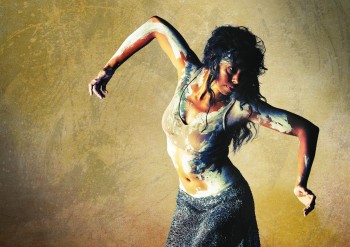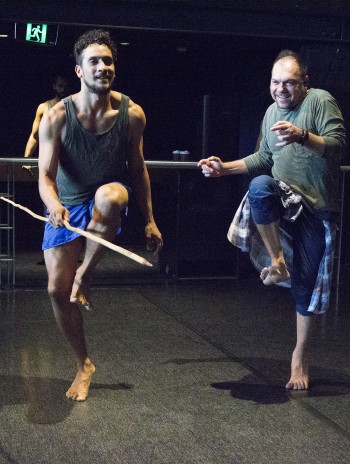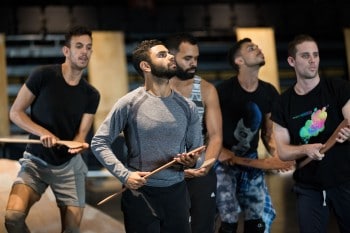Stephen Page: Bangarra Dance Theatre and Patygarang
Celebrating its 25th anniversary in 2014, Australia’s multi-award winning dance theatre company Bangarra Dance Theatre is about to premiere its latest work Patyegarang.

Photo by Greg Barrett
This powerful new work introduces us to Patyegarang, a young Aboriginal woman of intense and enduring courage, who lived in colonial times but is an inspiration for the respect of Aboriginal knowledge and language today.
As the first fleet arrives on Eora country in 1788, Patyegarang befriends Lieutenant William Dawes, gifting him her language in an extraordinary display of trust and friendship; inspiring our imaginations about ‘first contact’, with a sense of ‘what might have been?’.
Staying apart from the early Sydney settlement in a place called Tar-ra (now Dawes Point), William Dawes, an officer of the Royal Marines, an astronomer, mathematician and linguist, faithfully recorded his encounters with Patyegarang in his notebooks. Rediscovered in 1972, these diaries are transcripts of this remarkable cultural exchange; Patyegarang’s words a window into a rich and complex view of her world, its language, values and spirit.
Patyegarang marks the first time Bangarra has created a full-length work specifically from a Sydney story, while at the same time celebrating Bangarra’s unique ability to tell stories from the past through the prism of contemporary experience.

Photo by Jess Bialek
Artistic Director Stephen Page says of the new work:
“Patyegarang is a story that has been lingering in my mind for a long time. This young Aboriginal girl was from the Eora nation, the custodians of the land on which Bangarra has created and performed dance theatre works since 1989.
“In the year of the company’s 25th anniversary, Bangarra honours the Eora, through Patyegarang’s story, celebrating the significance of this place and its first peoples.
“Through discussions with local communities, and thanks to an ever-inspiring team of designers, story tellers and dancers, this story gives us an opportunity to reflect on our future as a new nation.”
A week and a half out from its world premiere Stephen is energised and not a little nervous. He faces the challenge of creating a dance work drawn from an historical narrative where there is still a sense of the unknown as to how it will play out, and how it will be received. Patyegarang “has challenged us, in this honouring of her spirit, and the Eora story”.
So what is it that makes this story so unique, I want to know?
“It is special in that there are very few positive first contact stories about white and black Australia, and even though it was so long ago, it invites us to consider ‘what if’? And perhaps ‘what might have been?’ There was a genuine sharing and respecting of culture between them, a legacy Dawes shared and documented in his diaries.”
Another recent production reflecting on the ‘first contact’ narrative, and in which Stephen was involved as the Artistic Associate, was the award winning The Secret River. How does Patygerang compare?
“The Secret River is a white man’s camping story which is written from a white perspective and is a narrative that is true to the attitudes of that time, with a focus on cultural divisions. Perhaps Pateygerang might be seen as my response to this, offering an Indigenous perspective and a story from the point a view of first nations people, with a narrative that implies a respectful sharing in a search for knowledge and understanding.”
Stephen acknowledges the challenge of re-creating this story while offering that “dance, music, costume, sound, lighting are great mediums to communicate energy and spirit”. His focus has not been on recreating a theatrical narrative, rather this work is an evocation, “one has to be wary of narrative in dance, not to fall into traps, avoiding too much balletic mime, and the whole period thing…With stylisation we are able to make a fresh, contemporary interpretation of their story.”
History tells us that Dawes was shipped back to the UK by the then Governor, apparently for refusing an order to take part in a retribution attack on local Aboriginal people. Stephen has enjoyed the discovery process on the floor that has seen him come to “respect him [Dawes] more” and that it is “through him” he has been able to come to a stronger sense of her.
As for Patygerang? “We don’t know what happened to her, she appeared and disappeared…Their time together was actually quite short, but there was a potency to their intimacy, a delicate process of experiencing, with Dawes carefully recording their unique communication, this sharing of language”.
After 23 years at the helm of Bangarra (most of the Company’s history), and as one of the longest serving Artistic Directors in the country, I’m interested to know whether he ever expects to tire of the role.
“There is a spirit about this place that flicks a light on inside of me…I am driven by this spirit. I need to be here, and it makes you obey it in a respectful way. I learned long ago that the spirit is way bigger than my ego and that I was fortunate to be in the role of caretaker…”, explains Stephen.
Stephen has a warmth and positive enthusiasm for his role which is infectious. ”I love what I am doing, and it will be hard to get me out of here. We have experienced the inevitable ups and downs, yet I have a strong board, creative collaborators, and a staff who have a loyalty and a passion for the Company that is ‘really special’.”

Photo by Jess Bialek
Stephen suggests that one of the keys to the Company’s duration, strength and harmony is that “we do not operate as a hierarchy” and the vision is ever evolving and always growing.
He is also excited by the work he is seeing from his contemporaries. “My backyard is 40,000 years of storytelling and knowledge and I feel that this is a beautiful moment in the 21st century where there is a black evolution of storytelling, with so many stories, clans, artists, and peers working creatively in theatre, TV and on film.” He cites recent examples of works by artists such as Wesley Enoch, Warwick Thornton, Wayne Blair, Leah Purcell and shows such as Redfern Now and The Gods of Wheat Street. “There is this wonderful clan of contemporary spirits, who are generating pride in our communities.”
After opening in Canberra Patygarang will tour nationally. Touring is clearly very important to Bangarra and is at the core of what the Company does. It is also one of few national companies that tours extensively regionally and remotely. After the Patygarang tour ends in September, the company will take Kinship to Darwin, Alice Springs, Adelaide, Cairns and Rockhampton.
Stephen acknowledges this relationship with community, “It is important for us to connect directly with Indigenous communities as we move through, acknowledging the various landscapes, songlines and languages, sharing stories and fuelling cultural knowledge. Those who watch our performances, share our stories and can see the diversity of our communities. For us really getting out there and connecting with community, doing it for your mob, boosts pride…theirs and ours. I recognize we have a foot in both camps, but we are trying to awaken spiritual consciousness”.
Stephen strongly believes it is important to be optimistic and is keen not to be seen as giving his energy over to the negative, though others may wish for him to be more actively political. “It’s about trying to strike the best balance, and for me the humane spirit is important”. However, that doesn’t mean he wouldn’t like to see genuine social and political change. ”It is about respect and acceptance, and it’s about time there was a government led social shift cementing the spirit and conciousness of first nation people through … the constitution.” He suggests the government, judging from its behaviour, is reluctant to acknowledge first nations people, even though he believes that “people are globally seeking a connection to spirituality and the land; there is spirituality in every land, and they are trying to find that spirit.”
Perhaps Bangarra through Patygarang‘s spirit is here to bring us that connection to spirit and land.
Sydney: June 13 to July 5 2014
Bookings: Sydney Opera House or 61 2 9250 7777
Canberra: July 17 to 19 2014
Bookings: Canberra Theatre Centre or p 61 2 6275 2700
Perth: July 30 to August 2 2014
State Theatre Centre of Western Australia
Bookings: Ticketec or p 1300 795 012
Brisbane: August 15 to 23
Bookings: Queensland Performing Arts Centre or p 136 246
Melbourne: August 28 to September 6 2014
Bookings: Arts Centre Melbourne or p 136 246


